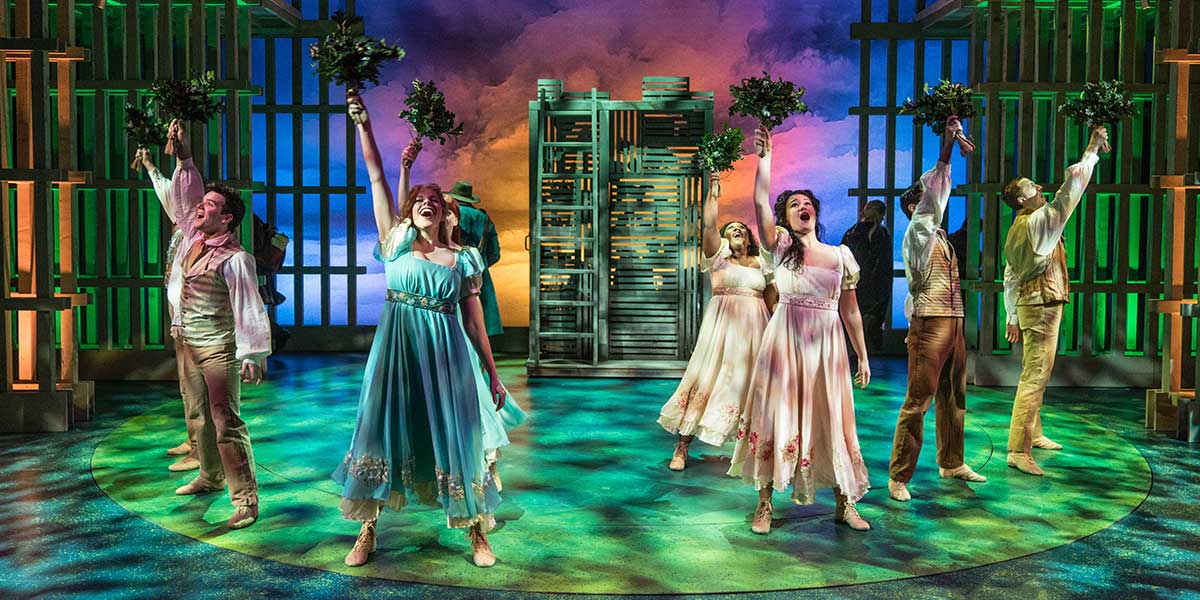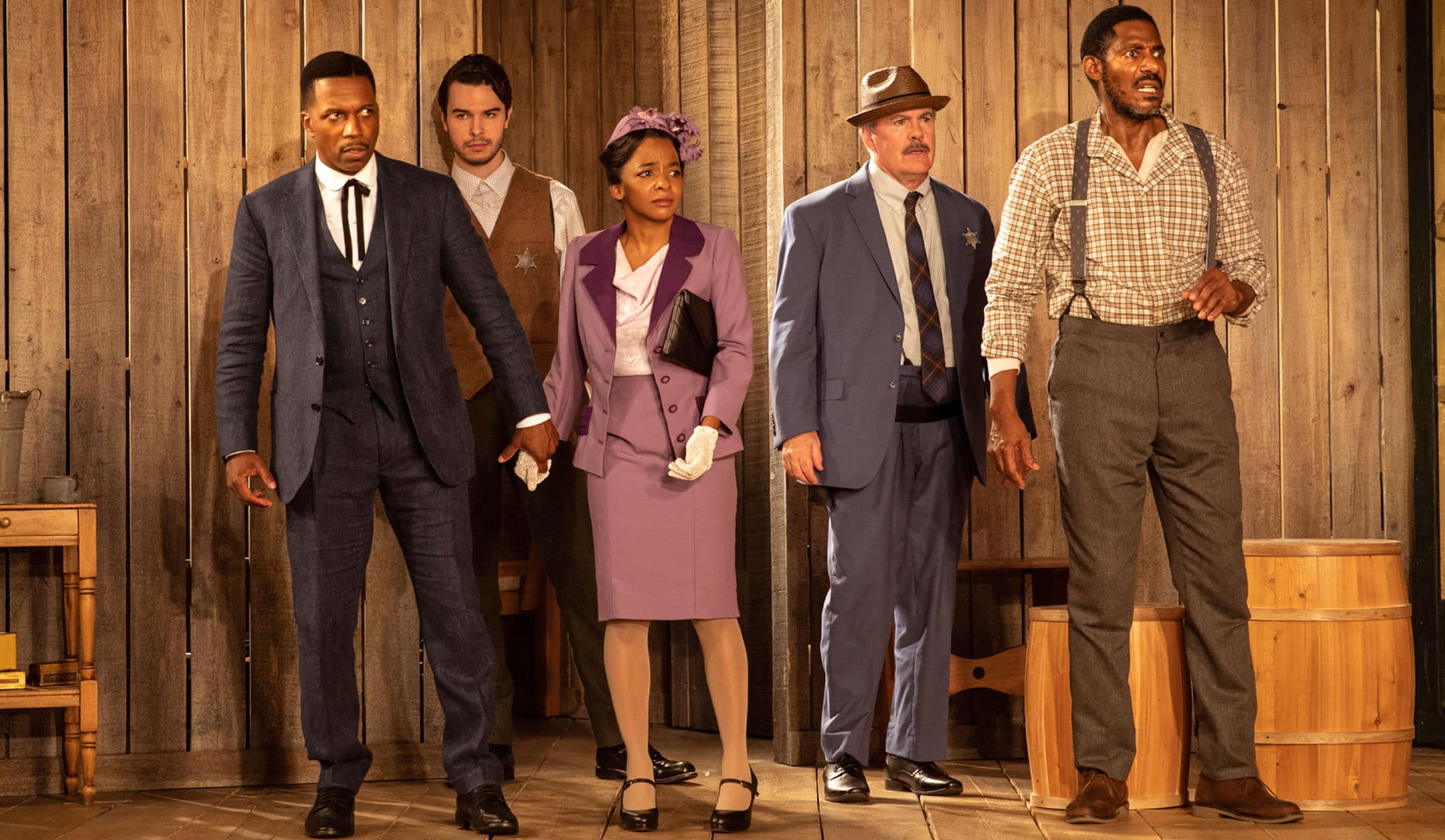
Hale Centre Theatre is Utah’s leading professional family theater. Having provided high-quality, family-friendly entertainment for more than thirty years, HCT recently opened its new world-class Mountain America Performing Arts Centre in Sandy, Utah. HCT was thrilled to be given the opportunity to invigorate Tuck Everlasting with spectacular set designs, charming period costuming, and strong performances on its new Sorenson Legacy Jewel Box stage.
Sally Dietlein, producer, vice president, and co-founder of Hale Centre Theatre, and Dave Tinney, director and choreographer at Hale Centre Theatre, recently reflected on the life lessons they learned from working on Tuck Everlasting.
1. A timeless book can make an everlasting play.
Dave: The script of Tuck Everlasting is a beautiful translation and adaptation of the book. It preserves so much of the innocence and the wonder of Natalie Babbitt’s novel, and the characters remain intact and are enhanced by the score. The music is spot on — a mix of musical theatre and folk elements with hints of turn-of-the-century ragtime and waltz…beautiful! The lyrics are sharp and mine the best of the novel’s philosophical gems.
Sally: It’s remarkable to see the fluidity of the production on our Jewel Box stage. We’d discovered new, interesting ways to present this play with the saturation of lighting and costumes. Tuck Everlasting is naturally a colorful story so it’s incredible to see how our production team brings that into the play. Every scene change is like turning a page in the actual book; it’s such a natural storybook and that comes through in the play adaptation.
2. Storytelling can transcend the use of words.
Dave: I love when dance is a major part of the storytelling, and the fact that the creators chose to use dance as the culminating story element is very brave and very smart. The volumes of information, emotion, relationship, chronology, and character that can be packed into ten minutes of dance is equal to pages and pages of the book or multiple scenes of dialogue. Dance also is a kinetic language. When done right, it bypasses the literal and cognitive, and reaches the audience in a very pure, soul-to-soul way. I learned to appreciate the emphasis on dance and am grateful to the original creators of the work who understood that so profoundly.
Sally: From the moment we did a preliminary reading with our artistic board and a few actors, there was no doubt in anyone’s mind that we should produce this play. This play is one of those rare treasures of theatre that brings an audience to tears because of the depth and range of emotions felt throughout the story using dance, lighting, set pieces, and more. I’ve seen men blubbering like babies and children on the edge of their seats during the show due to the full swing of emotions the audience experiences — joy, conflict, sorrow, intrigue — it has it all!
3. You don’t have to live forever, you just have to live.
Dave: Some great truths come through the story like: relationships need to grow and change through time; at the end of your life, what matters most is family; time can be a friend and not an adversary; and you don’t have to live forever, you just have to live. Those are themes that stand out to me. But I know that this is the kind of show that no matter what stage of life you are in, you will find something in this story that speaks to you deeply.
Sally: It opens up the discussion of how important it is to live. Winnie learns that she doesn’t want to separate from her family in order to live forever, she wants to be nested with her family and grow old with them no matter what. At the end of the day, truly living comes from sticking together with your family and the people you love regardless of insurmountable circumstances.
4. Life without gratitude is no life at all.
Dave: The thing I take away with me every time I see the show now, is gratitude: for life, for my relationships, for the chance to learn and change and grow at every stage of my life.
Sally: Every time I see a performance of Tuck Everlasting, I come away knowing that I am just fine right where I am at this point in time. It reminds me to enjoy the moments I’m in and to be grateful for them always.
5. There is joy to be found at every stage of life.
Dave: I have received so many letters from people who have said this show actually quelled some lifelong fears and made them feel joy about getting older. An older gentleman was leaving the theater with the aid of a walker, moving very slowly with his wife on one arm. He had tears streaming down his face and kept repeating, “You don’t have to be afraid of dying. You just have to live!” His wife just held him tightly and patted his hand and cried silently with him as they walked. This kind of story happens hundreds of times a week. This show doesn’t just entertain; it heals.
Sally: Tuck Everlasting is a universal piece of theatre that is important. The show deals with aspects of life we all go through — everyone deals with family, life or death, conflicts, decisions, relationships, and growing up. And we grow up at every age we’re in.
Dave: This is the kind of show that makes me proud to be doing what I do, and it makes me proud of those who had the courage to create this piece and who understand the power of live theatre.
Sally: This is a piece that people need to see wherever they are. I hope theaters nationwide catch on to this show. It doesn’t require much — it could be done in a reading in a black box on stools and the story and music will hold. That’s what you look for in a quality theatrical piece, a story that holds, and Tuck Everlasting is just that story.
Learn about performing Tuck Everlasting here. You can buy the script here.

Newly Available for Licensing – December 2025 (US)

Newly Available for Licensing – December 2025 (UK)

